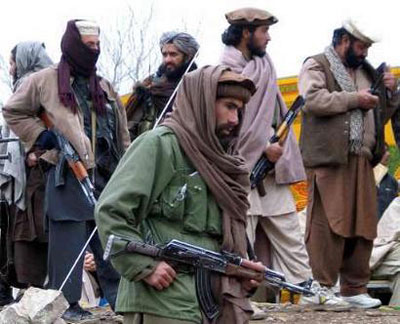 WASHINGTON -- Pakistan has replaced Iraq as al Qaeda's main focus, and the terror group has stepped up its efforts to destabilize the nuclear-armed South Asian nation, according to a senior U.S. military commander.
WASHINGTON -- Pakistan has replaced Iraq as al Qaeda's main focus, and the terror group has stepped up its efforts to destabilize the nuclear-armed South Asian nation, according to a senior U.S. military commander."Iraq is now a rear-guard action on the part of al Qaeda," said Gen. James Conway, the head of the Marine Corps and a member of the Joint Chiefs of Staff, in an interview. "They've changed their strategic focus not to Afghanistan but to Pakistan, because Pakistan is the closest place where you have the nexus of terrorism and nuclear weapons."
Gen. Conway also offered a stark assessment of the Afghan situation, saying the Taliban has built a rudimentary command-and-control network that enables the group's leadership to direct attacks across the country.
"They move troops around. They resupply. They provide money," he said. "It's effective and it's real. It's not just happenstance that these guys know where to go and what to do."
Senior U.S. military and civilian officials have grown increasingly pessimistic about Afghanistan and Pakistan. Last month, Adm. Mike Mullen, chairman of the Joint Chiefs, told lawmakers he was planning to develop a new strategy for the war in Afghanistan that would for the first time focus on both countries, which he said were "inextricably linked in a common insurgency that crosses the border between them."
Seven years into the war in Afghanistan, the resurgent Taliban carries out daily attacks on U.S. and North Atlantic Treaty Organization forces. More U.S. troops are killed in Afghanistan each month than in Iraq, and Afghan civilian casualties have been soaring. U.S. intelligence officials say that foreign militants who once flocked to Iraq now travel to Afghanistan instead, bringing more sophisticated bombs and weapons with them.
The top American commander in Afghanistan, Gen. David McKiernan, has asked for at least 20,000 additional forces, and the incoming Obama administration has signaled that it will send the reinforcements sometime next year. The influx will push U.S. troop levels there to more than 52,000, a record.
Still, many senior U.S. officials fear that the additional American forces won't be enough to stabilize Afghanistan unless Pakistan takes stronger measures against the militants who operate in havens in its anarchic tribal areas. U.S. commanders say militants operate training camps in the tribal areas and also cross freely from Pakistan into Afghanistan to carry out attacks there.
Gen. Conway said Pakistan's best troops were deployed along its border with India and weren't being used in the fight against the country's militants. Pakistan's leadership doesn't yet seem to accept that terrorism poses an existential risk to the country's future, he added. "Pakistan has to understand there's a dire threat there that they have to act against," he said.
Pakistan's failure to take concerted action against the Islamist fighters has led the Central Intelligence Agency and the U.S. military's secretive Special Operations Command to launch a wave of missile strikes against insurgent targets inside Pakistan.
 The attacks by unmanned aerial drones have killed at least eight senior al Qaeda figures along with dozens of Pakistani civilians. Islamabad has given tacit approval to the strikes, a source of public anger across Pakistan.
The attacks by unmanned aerial drones have killed at least eight senior al Qaeda figures along with dozens of Pakistani civilians. Islamabad has given tacit approval to the strikes, a source of public anger across Pakistan.Gen. Conway said the attacks had killed al Qaeda figures involved in planning attacks on targets in Europe and the U.S. "It is important that we keep them on the run," he said. Still, he described the strikes as a "high-wire act" that risked damaging relations.
The Pakistani government has bristled at such criticism and insisted that it is firmly committed to defeating the country's militants. Officials at Pakistan's embassy in Washington weren't available to comment.
Gen. Conway said the U.S. military needed to reorient itself in response to the changing conditions in Iraq and Afghanistan. Iraq's security situation has improved so much that for the first time it "smells like victory" there, he said. The gains should clear the way for the withdrawal next year of many of the 20,000 Marines currently deployed to the country, he added.
The departures, in turn, would free up additional Marines for Afghanistan, where the fighting is likely to accelerate in 2009. The war on terror began in Afghanistan and Pakistan, and Gen. Conway suggested that it would need to conclude there rather than in Iraq.
"I don't think there is anybody in Iraq these days planning a strike on the U.S.," he said. "But I fear there are people in Afghanistan or Pakistan who could be doing that very thing."
Separately, Pakistani officials said they need billions of dollars more to stabilize the economy, battered by high oil prices and an increasingly bloody fight against the Taliban and al Qaeda, even after agreeing with the International Monetary Fund on a $7.6 billion loan.
A senior finance ministry official said: "We plan to go back to our friends, America, to London, to Berlin and the rest of Europe, to China, to ask for help." But hopes for cash infusions from allies facing their own economic problems "may not be realistic."
The announcement of the loan capped a humbling two months for President Asif Ali Zardari, who leads Pakistan's first democratically elected government in almost a decade. On taking office in September, he had insisted Pakistan wouldn't need IMF aid.